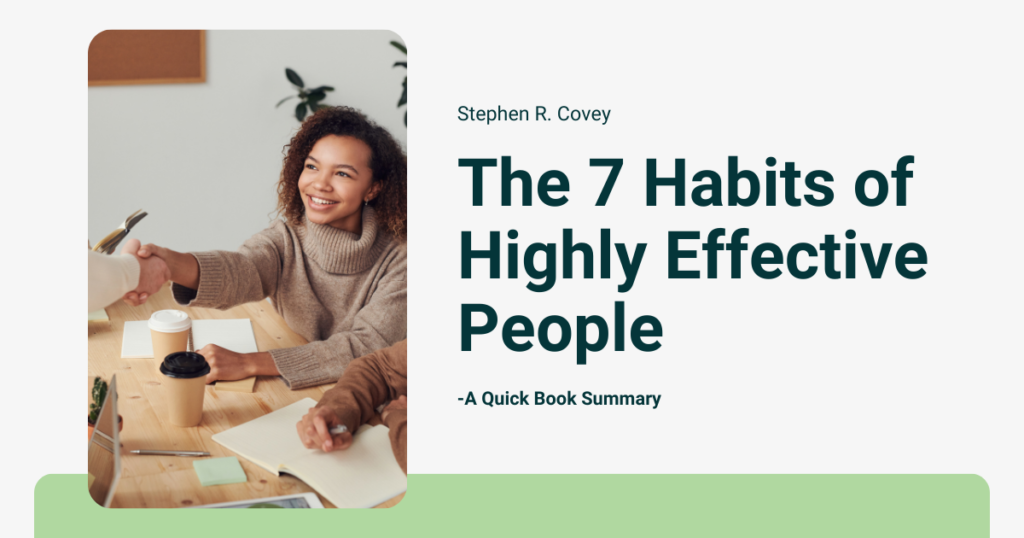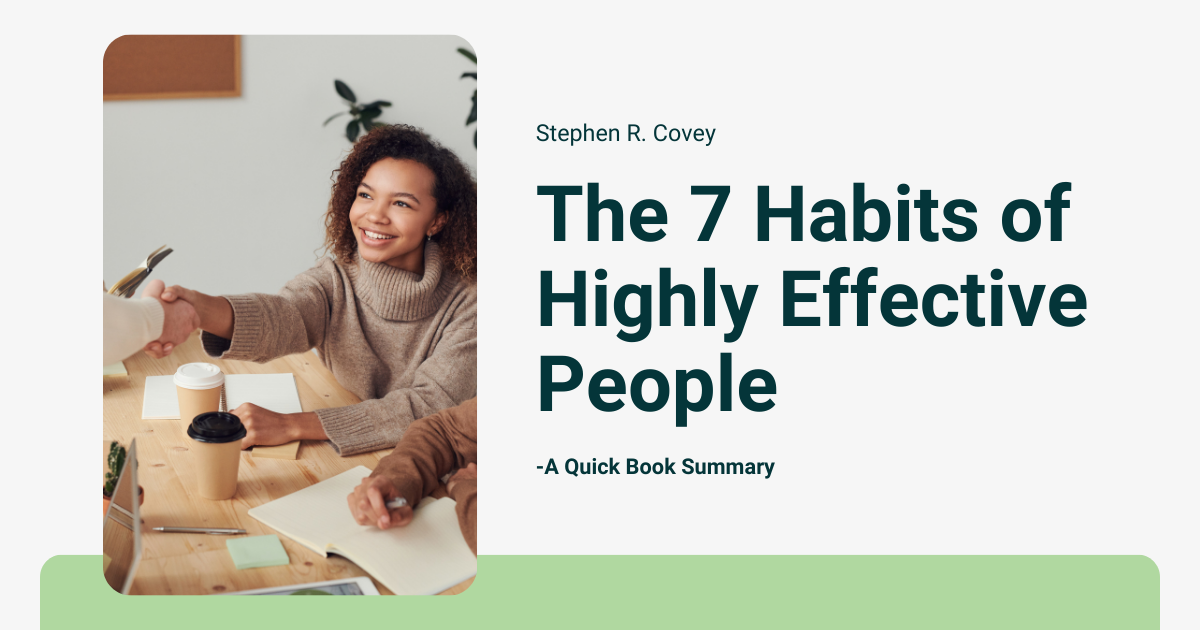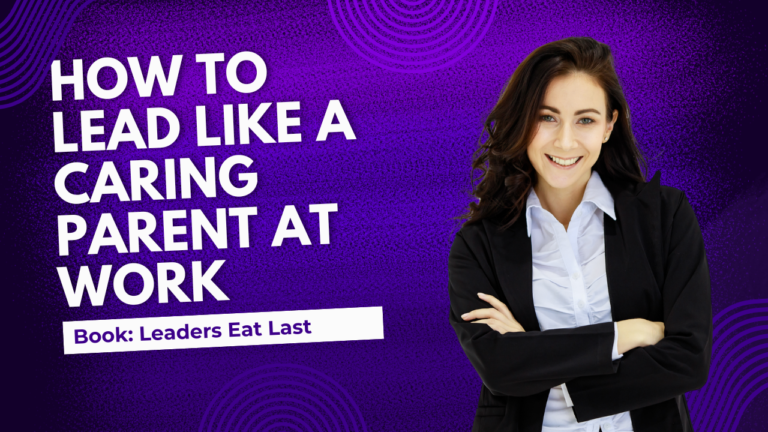7 Habits of Highly Effective People by Stephen Covey is more than just a self-help book. It is a comprehensive guide to personal and professional development. It was published in 1989, and has since become a cornerstone in the fields of leadership and personal growth.
Covey’s principle-centered approach provides a roadmap for achieving success. It is applicable not for just in the workplace, but in all areas of life.
This summary will provide a comprehensive overview of Covey’s key concepts but it is important to note that it is not a replacement for the book itself. To gain the full benefits and insights that Covey offers, readers are encouraged to explore the complete text.
What Are 7 Habits of Highly Effective People?
Core of “The 7 Habits of Highly Effective People” revolves around the idea of achieving success through personal and interpersonal effectiveness. Stephen Covey categorizes the seven habits into three distinct sections:
- Private Victory: Habits 1, 2, and 3 focus on self-mastery and moving from dependence to independence.
- Public Victory: Habits 4, 5, and 6 emphasize teamwork, collaboration, and moving from independence to interdependence.
- Renewal: Habit 7 is about continuous growth and improvement, ensuring you maintain and enhance the habits you develop.
This principle-centered approach helps individuals create a balance between personal development and effective interaction with others. Professionals and teens alike can build a foundation for long-term success by mastering these habits.

Habit 1- Be Proactive
“Be Proactive” is about taking responsibility for your life and actions. Covey contrasts proactive behavior with reactive behavior, where reactive people allow external circumstances to dictate their responses. Proactive individuals, on the other hand, focus on their ability to choose their reactions, regardless of the situation.
Being proactive might involve taking responsibility for their academic performance by seeking help when needed and managing their time effectively for teens. For a working professional, being proactive could mean taking the initiative to lead a project at work or addressing a recurring problem before it escalates.
Both teens and professionals can benefit from focusing on their circle of influence—those things they can control, rather than worrying about things outside their control.
Habit 2- Begin with the End in Mind
“Begin with the End in Mind” emphasizes the importance of having a clear vision of what you want to achieve. Covey suggests that effective people envision their desired outcomes and set goals that guide their actions toward achieving those outcomes.
For teens, this habit might mean setting academic and personal goals, such as aiming for a specific college or career path, and aligning daily actions with those goals. This could involve setting career goals, like achieving a leadership position or transitioning to a new industry, and making strategic decisions that support these objectives for professionals.
We can benefit from creating a personal mission statement to guide their daily actions.
Habit 3- Put First Things First
“Put First Things First” is about managing your time and energy effectively by focusing on what is most important. Covey introduces the time management matrix, which helps individuals categorize tasks based on their urgency and importance.
For teens, prioritizing might involve focusing on studying for exams or completing assignments before engaging in leisure activities. For professionals, it could mean prioritizing high-impact work projects over less critical tasks.
Teens need to learn to balance urgent and important tasks to maintain productivity and achieve their goals.
Habit 4- Think Win-Win
“Think Win-Win” is about adopting a mindset that seeks mutual benefit in interactions. Author argues that successful relationships and negotiations are built on a foundation of cooperation and a belief that there is enough success to go around for everyone.
For teens, this might involve working collaboratively on group projects and ensuring all members contribute and benefit.
For professionals, thinking win-win could mean negotiating contracts or deals that are fair and beneficial for all parties involved. Professionals can foster stronger relationships by adopting a win-win mindset.
Also read: Atomic Habits Book Summary- Master the Art of Habit Building
Habit 5- Seek First to Understand, Then to Be Understood
“Seek First to Understand, Then to Be Understood” highlights the importance of empathetic listening. Covey believes that effective communication starts with understanding the other person’s perspective before expressing your own.
For teens, this habit can be applied by listening to parents, teachers, or friends before responding in conflicts or discussions. For professionals, it’s essential in the workplace to listen to colleagues, clients, or supervisors to ensure effective problem-solving and collaboration. Both teens and professionals will find that understanding others’ perspectives can lead to better outcomes in communication.
Habit 6- Synergize
“Synergize” is about harnessing the power of teamwork to achieve goals that would be difficult or impossible to reach alone. Covey describes synergy as the creation of a whole that is greater than the sum of its parts.
For teens, synergy can be demonstrated in group projects or team sports. Where each member’s strengths contribute to the group’s overall success. For professionals, synergizing might involve collaboration across departments to achieve a common goal.
Both teens and professionals can achieve better results by valuing and leveraging the strengths of others.
Habit 7- Sharpen the Saw
“Sharpen the Saw” focuses on the need for continuous self-improvement and self-care. Author stresses the importance of regularly renewing yourself in four areas: physical, mental, emotional, and spiritual.
For teens, sharpening the saw could involve balancing schoolwork with physical exercise, hobbies, and spending time with family. It’s about avoiding burnout by making time for self-care, learning new skills, and engaging in activities that recharge your energy for professionals.
Both groups need to maintain balance in life to stay productive and motivated.
How to Apply 7 Habits in Your Daily Life
Implementation of 7 of these habits can be challenging, especially when you’re busy with school or work. But with help of consistent effort and a proactive approach, these habits can become a natural part of your daily routine.
For teens, start by identifying which habits you feel most comfortable with and focus on developing them first. For instance, if time management is a struggle, begin by applying Habit 3: Put First Things First. Use a planner or an app to schedule your tasks and prioritize what’s most important. As you build confidence in one habit, move on to the next.
For professionals, it might be helpful to integrate these habits into your work routine. For example, apply Habit 1: Be Proactive by taking ownership of your tasks and deadlines, rather than waiting for others to guide you. Gradually incorporate the other habits like prioritize key projects or foster collaboration in your team for enhancing your effectiveness at work.
Real-Life Success Stories from Applying the 7 Habits
There are countless examples of individuals who have transformed their lives by applying the 7 habits. Teens who have embraced these principles often report improved academic performance, better relationships, and a clearer sense of purpose.
For instance, a high school student who began with the end in mind might have successfully gained admission to their dream college by setting clear goals and working diligently toward them.
Many leaders attribute their success to Covey’s habits in the professional world. A project manager who consistently applies the habit of putting first things first might lead their team to complete projects on time and within budget. Helping him to earn respect and advance their career.
These real-life success stories highlight the power of the 7 habits in driving personal and professional growth.
Conclusion
7 Habits of Highly Effective People offers a powerful framework for achieving success in all areas of life. Teens can build a strong foundation for their future, while professionals can refine their approach to work and relationships.
However, it’s essential to remember that this summary is just a starting point. To full grasp and benefit from Stephen Covey’s insights, readers are encouraged to read the full book.





[…] Also Read: 7 Habits of Highly Effective People: For Teens […]